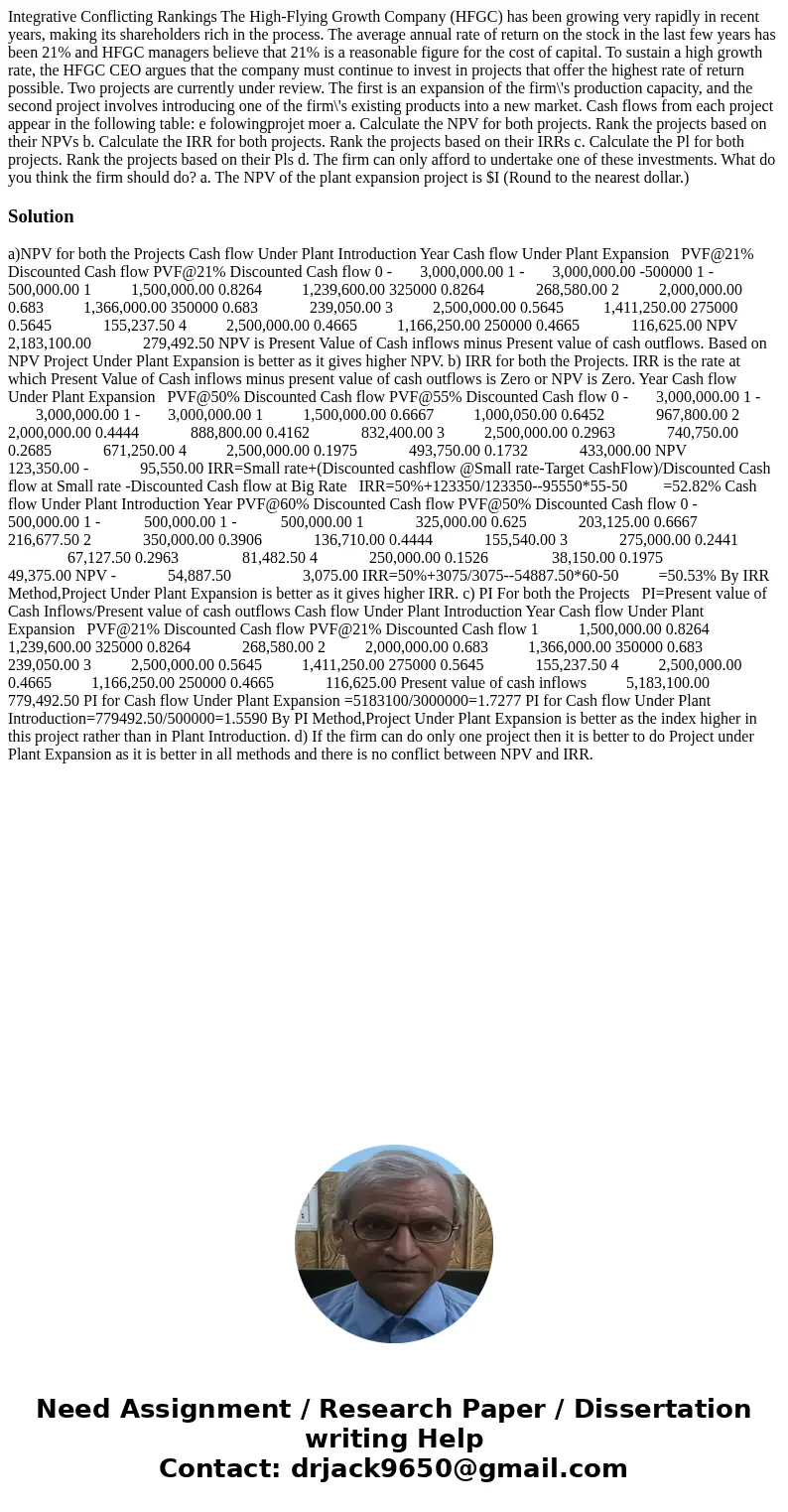Integrative Conflicting Rankings The HighFlying Growth Compa
Integrative Conflicting Rankings The High-Flying Growth Company (HFGC) has been growing very rapidly in recent years, making its shareholders rich in the process. The average annual rate of return on the stock in the last few years has been 21% and HFGC managers believe that 21% is a reasonable figure for the cost of capital. To sustain a high growth rate, the HFGC CEO argues that the company must continue to invest in projects that offer the highest rate of return possible. Two projects are currently under review. The first is an expansion of the firm\'s production capacity, and the second project involves introducing one of the firm\'s existing products into a new market. Cash flows from each project appear in the following table: e folowingprojet moer a. Calculate the NPV for both projects. Rank the projects based on their NPVs b. Calculate the IRR for both projects. Rank the projects based on their IRRs c. Calculate the Pl for both projects. Rank the projects based on their Pls d. The firm can only afford to undertake one of these investments. What do you think the firm should do? a. The NPV of the plant expansion project is $I (Round to the nearest dollar.) 
Solution
a)NPV for both the Projects Cash flow Under Plant Introduction Year Cash flow Under Plant Expansion PVF@21% Discounted Cash flow PVF@21% Discounted Cash flow 0 - 3,000,000.00 1 - 3,000,000.00 -500000 1 - 500,000.00 1 1,500,000.00 0.8264 1,239,600.00 325000 0.8264 268,580.00 2 2,000,000.00 0.683 1,366,000.00 350000 0.683 239,050.00 3 2,500,000.00 0.5645 1,411,250.00 275000 0.5645 155,237.50 4 2,500,000.00 0.4665 1,166,250.00 250000 0.4665 116,625.00 NPV 2,183,100.00 279,492.50 NPV is Present Value of Cash inflows minus Present value of cash outflows. Based on NPV Project Under Plant Expansion is better as it gives higher NPV. b) IRR for both the Projects. IRR is the rate at which Present Value of Cash inflows minus present value of cash outflows is Zero or NPV is Zero. Year Cash flow Under Plant Expansion PVF@50% Discounted Cash flow PVF@55% Discounted Cash flow 0 - 3,000,000.00 1 - 3,000,000.00 1 - 3,000,000.00 1 1,500,000.00 0.6667 1,000,050.00 0.6452 967,800.00 2 2,000,000.00 0.4444 888,800.00 0.4162 832,400.00 3 2,500,000.00 0.2963 740,750.00 0.2685 671,250.00 4 2,500,000.00 0.1975 493,750.00 0.1732 433,000.00 NPV 123,350.00 - 95,550.00 IRR=Small rate+(Discounted cashflow @Small rate-Target CashFlow)/Discounted Cash flow at Small rate -Discounted Cash flow at Big Rate IRR=50%+123350/123350--95550*55-50 =52.82% Cash flow Under Plant Introduction Year PVF@60% Discounted Cash flow PVF@50% Discounted Cash flow 0 - 500,000.00 1 - 500,000.00 1 - 500,000.00 1 325,000.00 0.625 203,125.00 0.6667 216,677.50 2 350,000.00 0.3906 136,710.00 0.4444 155,540.00 3 275,000.00 0.2441 67,127.50 0.2963 81,482.50 4 250,000.00 0.1526 38,150.00 0.1975 49,375.00 NPV - 54,887.50 3,075.00 IRR=50%+3075/3075--54887.50*60-50 =50.53% By IRR Method,Project Under Plant Expansion is better as it gives higher IRR. c) PI For both the Projects PI=Present value of Cash Inflows/Present value of cash outflows Cash flow Under Plant Introduction Year Cash flow Under Plant Expansion PVF@21% Discounted Cash flow PVF@21% Discounted Cash flow 1 1,500,000.00 0.8264 1,239,600.00 325000 0.8264 268,580.00 2 2,000,000.00 0.683 1,366,000.00 350000 0.683 239,050.00 3 2,500,000.00 0.5645 1,411,250.00 275000 0.5645 155,237.50 4 2,500,000.00 0.4665 1,166,250.00 250000 0.4665 116,625.00 Present value of cash inflows 5,183,100.00 779,492.50 PI for Cash flow Under Plant Expansion =5183100/3000000=1.7277 PI for Cash flow Under Plant Introduction=779492.50/500000=1.5590 By PI Method,Project Under Plant Expansion is better as the index higher in this project rather than in Plant Introduction. d) If the firm can do only one project then it is better to do Project under Plant Expansion as it is better in all methods and there is no conflict between NPV and IRR.
 Homework Sourse
Homework Sourse